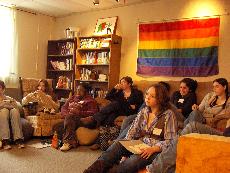“We have to stop looking at AIDS as a face,” said AIDS summit keynote speaker, Thelma Wright. “We have to start realizing that it is a disease that does not discriminate.” The Community Aids Awareness Project (CAAP) held an AIDS summit on Feb. 18 in Founders Hall. It featured a presentation by James Shields on the importance of community involvement; a personal story and brief history of HIV by sociology professor Martha Lang; an “AIDS: Here and Abroad” panel run by sophomore Martha Assefa and first-year Muhanji Afanda; the presentation by Wright and three workshop sessions.
AIDS Fellows senior Erin Burns and junior David Norton planned the event, along with sophomores Saron Smith-Harden and Marshall Jeffries.
“No matter how educated you are, you can always learn more,” said sophomore Joe Pelcher. “Just because things seem OK in our own communities does not mean that other places don’t need our help.”
Wright said that the lack of funding has made AIDS a very serious problem because many people are losing interest in it.
“People have to spend more time fighting for the money instead of showing compassion towards the patients,” said Wright.
“Martha Lang said one of the rudest questions people ask HIV patients is ‘How did you get it?’ as if it’s the victims’ fault,” said Pelcher. “People think that if they are not promiscuous, if they are not gay, and if they are white that they can detach themselves from the disease, because they see it as a moral disease.”
Wright said that while she does not discourage people from being tested for HIV, there are hardships HIV-positive people face like lack of sufficient funding.
“You need to look at what happens after you do get tested and find out that you are HIV-positive,” said Wright. “So many people fall into the trap of thinking that they will be able to get the medication they need right away, but there is a long waiting list and it’s hard for people to know they are HIV-positive when medicine is not provided for them.”
“(Lang) put it into perspective how new of a problem AIDS is in this country, and how quickly it has become such a massive problem,” said first-year Raji Ward. “I learned a lot about what it does to the body, and it also puts into perspective the severity of the disease.”
Thomas Clodfelter, a Greensboro resident, has been living with HIV for the past 16 years.
“I chose to put myself out here because I want students to know that they can decide to live their life to their fullest potential, without stress, without drugs, and without prison,” said Clodfelter.
Josh Wynne, a graduate student at N.C. State found out that he is HIV-positive last April.
“Having HIV has driven me and has given me a new focus in life,” said Wynne. “I feel that my purpose in life is to help (HIV patients) and others become more comfortable with the disease by educating them.”
Clodfelter emphasized the importance of living responsibly as an essential part of HIV prevention.
“I put myself and my life through hell as a teenager with all the drugs and the sex,” said Clodfelter. “But, getting HIV was about change. I saw things differently, and I wanted to see that the future, the next generation, will learn to live differently. I want to start a path of being responsible.”
Wynne stressed the importance of education for HIV patients, as well as others, so they can prevent this disease from spreading further.
“(Learning that I am HIV-positive) was extremely difficult and agonizing,” said Wynne, “but if you just manage to keep some little kernel of hope and can educate yourself and others about HIV, you become more empowered and better able to deal with it.”
“During the James Shields presentation we talked a lot about bridging the gap between what we learn in the classroom and the rest of our life,” said transfer first-year Hannah Johnston. “In essence we learned about applying what we learn in the classroom to our life experiences, which can be nurtured through community involvement.”
“You have a voice and your voice needs to be heard,” said Wright, “and the most important place for your voice to be heard is in your legislative office.”
Both Clodfelter and Wynne hope that by getting involved with the community and having open dialogue with people they can get rid of stereotypes about people who are living with HIV.
“I’m here to let you know that you can make your life better by getting educated and getting involved in your community,” said Clodfelter.
“People who have HIV are just people, and there’s a lot of stigma out there, even in the gay community,” said Wynne. “I want to present a human aspect of the disease – that I am not different than anyone here.”
According to Smith-Harden, a satisfying number of people attended. “I was really happy with the turnout,” said Smith-Harden. “I think all of the workshops were really informative and powerful, and the fact that we had a debriefing session gave us ideas about what to plan for the future.”
“I’m very proud of the fact that we have dedicated students on this campus who have the ability and the want to put together such an organized event,” said Ward.

